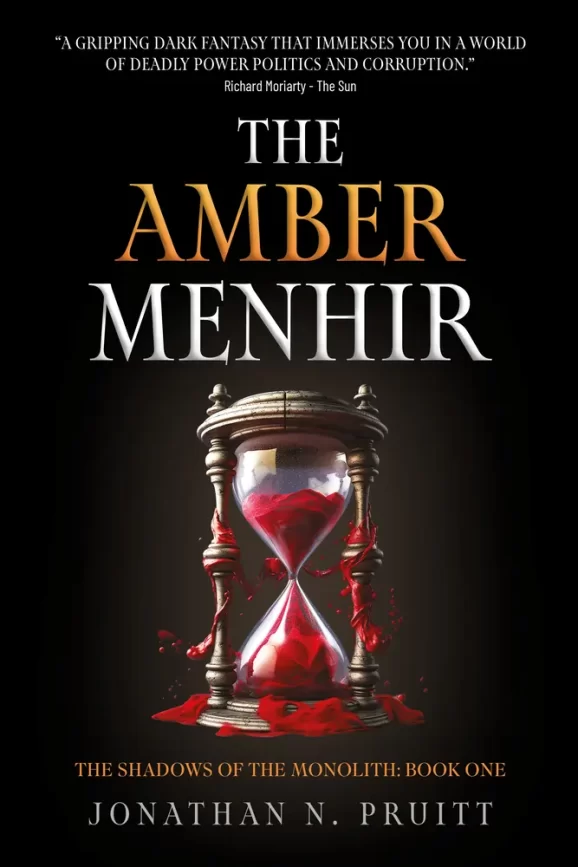From scientist to storyteller

John E. Kaye

Once hailed as the rising star of ecology, Jonathan N. Pruitt saw his career collapse through scandal. Three years on, he has reinvented himself as a fantasy author. We find out more about the man viewed by the science community as a bête noire
By Timothy Arden
He may only be in his thirties, but American author Jonathan N. Pruitt is already busy thinking of the legacy he will leave behind.
At the turn of the decade, he fully expected that it would be in the field of science. He had, after all, been revered and respected as one of the world’s leading behavioural ecologists.
Known especially for his studies of the social behaviour of arachnids, Pruitt was dubbed ‘Spiderman’ and, like his fictional counterpart, had a knack of scaling great heights with relative ease.
A personable persona combined with a razor-sharp intellect saw him becoming Associate Professor of behavioral ecology at McMaster University, Ontario, only a few short years after accepting his first professorship post.
At the same time, he received a prestigious Canada 150 Research Chair, in Biological Dystopias, as part of the country’s multi-million dollar programme to bring together the most brilliant minds and enhance the nation’s reputation as a global centre for scientific research.
Success had always been on the cards for the ambitious academic, despite humble beginnings in the economically struggling rural county of Florida which, he says, was “best known in the 1980s and 1990s for record-high teen pregnancy and HIV rates”.
A precocious and hyperactive child, he was by the age of 12 a concert pianist and nationally ranked chess player, as well as a budding actor.
His memories of school, however, are not recalled with particular fondness, as he explains.
“I found it hard to fit in with other kids, and preferred the company of adults, who were less cruel,” he says.
“I tried to win over my peers through accomplishments, trying to convey that I was worthy of their attention, but that fell flat.
“There was no meeting of minds, but I recognised early on that when it came to the end of each school year, when the academic prizes were doled out, at least there would be hollow applause as I collected my awards.”
“This, then, became my form of validation; the currency by which I would substantiate my sense of self identity.”

Before his career came crashing, Jonathan N. Pruitt was a leading and prodigious ecologist.
Sailing through his studies, he graduated with a bachelor’s degree in biology from the University of South Florida at the age of 20 and obtained his PhD at the University of Tennessee four years later.
Within a year of graduation, he had obtained a faculty position at the University of Pittsburgh, where he would make his name researching the impact of animal personalities on societal organisation and collapse.
But his meteoric rise to the top tier of academia would ultimately be matched by an unforeseen and spectacular fall from grace.
In early 2020, an international controversy emerged after data anomalies were found in a number of Pruitt’s published scientific papers.
Within months, and prior to the outcome of a formal investigation by McMaster’s Hearings Committee into possible misconduct, peer-reviewed journals began retracting papers authored and co-authored by Pruitt.
Pruitt responded to the allegations of data manipulation and record-keeping irregularities by stating they were mistakes, and even went so far as to replicate studies in question and document them in real time by wearing a body camera, but the damage was done.
In November 2021, Pruitt was placed on a paid administrative leave by McMaster and by July of the following year he had resigned from the prestigious post after receiving an undisclosed settlement.
McMaster’s investigation finally ended in May of this year, with the conclusion that Pruitt had committed data duplication and inadequate record-keeping on eight papers. In total, 15 of his papers had been retracted, 11 more had received an expression of concern, and four others had been corrected.
The furore over the scandal, which became known as ‘#PruittGate’, was unsurprisingly loud and damning within the international academic community.
Pruitt, however, maintains that the data anomalies were entirely accidental.
He said: “To put things into perspective, I’ve had more than 140 papers published and anomalies constituted only two per cent of the data examined.
“And out of the papers in question, there was only one where the data anomalies proved determinative for the major conclusion drawn.
“More often than not, removing the anomalies improved the visibility of patterns and strengthened a study’s inferences.
“Why would I deliberately manipulate data if not for a favourable gain? And do so in such a ham-fisted manner that I was bound to get caught? It doesn’t make sense.
“Nevertheless, I hold my hands up for being sloppy and for falling below the expectations of an academic in my position.
“It’s embarrassing to me as a professional, and I am repentant for my part in the entire affair.
“One does not become engulfed in international scandal from all the good decisions one makes, and I bear greater responsibility than anyone.”

Jonathan N. Pruitt has now reinvented himself as an author of dark fantasy worlds. His debut novel, The Amber Menhir, is a subversively satirical and stunningly confident debut.
It was a huge blow for Pruitt, who says he was “ceremoniously disposed of”, having now found himself compared to other disgraced scientists such as Diederik Stapel and Jan Hendrik Schön.
He continued: “I’m someone who lives off the approval of others. It’s a thirst that never dies and so watching my career burn was painful.
“It left me wondering what would remain of my life. Could there ever be a fulfilling path forward for someone so conspicuously fallen?
A natural-born educator, Pruitt began teaching biology at a Catholic high school, a vocation he finds “as emotionally rewarding as being a professor”.
But still hungry to build a legacy that he can be proud of, he turned to another of his passions: the world of epic fantasy.
His debut novel, the satirical dark fantasy The Amber Menhir, has just been released. The first instalment of a five-part series, The Shadows of the Monolith, it is set on an unnamed world controlled by a vampiric elite seeking new magic to save all life from destruction by a celestial body known only as ‘Calamity’.
What the masses don’t know, however, is that the towering houses of blood-sucking scholarship, the menhirs, are rotten with bitter political rivalries between the six noble factions.
Pruitt credits epic fantasies with keeping him sane while conducting field work in the remotes of the world, from the rainforests of Australia to the deserts of Namibia and Madagascar.
And he reasons that turning to literature is a natural move from a career in science.
He said: “I spent a lot of time in the developing world, between two and five months a year, in locations that could easily be described as the ‘middle of nowhere’.
“There was often little outside of the building or vehicle I’d be in, and if the weather was bad, I could be stuck for days sheltering.
“Books, especially epic fantasy, got me through those long hours when not researching. The great thing was that they didn’t depend on there being power, which was often missing. All I needed was a candle or two.
“Even during my academic career I’d entertained the idea of one day becoming a novelist, though I didn’t expect it to happen so soon!
“Scientists are storytellers so there’s a circularity to turning to fiction, and in a position like mine, where my veracity has been brought into question, it makes sense to compose works where the very premise is that the statements are not factual.
“I’m oddly thankful for the opportunity and I’ve learned that you can be far more forthcoming in fantasy fiction than you could ever contemplate in non-fiction.
“But while my books include political commentary and satirical prods, first and foremost they are meant to entertain.
“I have high hopes for the series. Thinking about my legacy, I’d like for my tombstone to say something a little different than ‘disgraced spider biologist’!”
The Amber Menhir (Book One of The Shadows of the Monolith) by Jonathan N. Pruitt is out now on Amazon in paperback, hardcover, and eBook formats, published through Spinner Loom Press and priced £15.34, £28.58, and £9.99 respectively. For more information, visit The Shadows of the Monolith.com or follow the author on Instagram.
Exclusive Extract From The Amber Menhir
The Amber Menhir by Jonathan N. Pruitt is dark Fantasy’s take on Ayn Rand. Here is an exclusive extract from chapter six, ‘Sensing the Threads’.
“I am Leticia Avevaios,” said the Tilter. Her eyes stayed fixed on something unseen before her, giving her a vacant, almost fearful countenance as she lectured.
Lavinia, naturally, rolled her eyes.
“It is the task of the Tilters of the Hourglass to prod the most delicate and elusive of reality’s threads,” Avevaios murmured. “We see reality on an axis of threads that ensnares all others.”
Lavinia snorted.
Avevaios approached. “Tilters see objects not only as they are, but as they have been and could be. We see nigh-realities and almost-events everywhere. Though most are blind to this thaumaturgy, Lavinia Thalsem, it is no laughing matter, I assure you.”
Lavinia went rigid.
Tara took her turn to beam at her adversary apparent.
“How’d you know my name?” sniped Lavinia. “Some kind of trick? You know my family?”
“You told me, my dear,” said Avevaios. The Tilter fixed Tara with her watery eyes as she grazed tables and chairs with elongated fingers. “When attuned, our minds see the trails left by objects as they pass through time. An adept Tilter can seize those threads and braid them to suit her needs, and our abilities scale when we work together.”
The snickers and smiles about the room extinguished.
Peony raised her hand and spoke. “So, the Tilters travel through time? Is that right?”
Gods be good, Peony had learned nothing from her encounter with Weaver Peebles.
“A common misconception, Ms. Bianchi,” said the Tilter. “You have no reason to be afraid of such questions here. We have nothing to hide from you.”
Tilter Avevaios studied Tara.
“You can’t even time travel?” Lavinia chided. “Then why are you called Tilters of the Hourglass? Hourglasses tell time, don’t they?”
Tilter Avevaios’s attention swiveled to Lavinia.
“We draw upon the past we experienced and those nigh-pasts we almost experienced.”
Avevaios pinned Lavinia with her huge eyes. “We can learn from these almost-pasts, of what might have happened, but didn’t quite. In some special cases, we can veto a first reality in favor of one of its almost-brethren. Though, such feats require great stores of saprolite wine and groups of Tilters in concert. But this is what the Harvest is for.”

Jonathan N. Pruitt satirical dark fantasy novel, The Amber Menhir, is out now.
Lavinia opened her mouth as if to gripe.
As she did, the Tilter whipped a pair of dice from atop Tara’s table. They clicked until they landed on a three and a five. Every eye there stared at them, save for Tilter Avevaios’s. Her attention remained on Tara.
The ascendants around Tara gasped. Tara broke herself from the Tilter’s gaze to find the dice depicting a pair of sixes.
“So what?” said Lavinia.
“Imagine it had been an arrow that struck your diminutive heart, Ms. Thalsem. But in an adjacent probability, the arrow only scraped a rib. Small differences in outcomes are not trivial,” replied Avevaios. She nodded at Tara slowly, as if approving some train of thought in Tara’s mind.
A pressure grew behind Tara’s right eye as she met Avevaios’s stare.
“Our aptitudes allow us to audit the webs of time, and on occasion, to spin the threads themselves. Though a Tilter is powerful on her own, her abilities are multiplied by her sisters,”
Avevaios explained. “Together, we see farther across the veil from our reality into adjacent worlds.
And when it serves us, we can draw from those worlds and pull parts of them across the veil.” Tilter Avevaios’s voice grew hard as iron. “One need not accept the world before them as it is. Learn this from the Tilters if you can, ascendants. When Calamity is solved, it will not be from the workings of isolated scholars, jealously guarding their work. Collaboration is the strongest power any can possess.”
Lavinia squirmed.
Tilter Avevaios’s eyes flicked to her, and the pressure behind Tara’s eye retreated. “Poisonous individualism is the rot of too many scholars. Learn now to see it in yourself, and expunge it.”
In the gravid silence that followed, Tara promised herself she would do everything in her power to join the Tilters of the Hourglass.
RECENT ARTICLES
-
 Afore SURA awarded Pension Fund Management Company of the Year 2025
Afore SURA awarded Pension Fund Management Company of the Year 2025 -
 BOV Fund Services Limited wins in The European Banking & Finance Awards 2024
BOV Fund Services Limited wins in The European Banking & Finance Awards 2024 -
 Amberdata wins two titles in The European Banking & Finance Awards 2024
Amberdata wins two titles in The European Banking & Finance Awards 2024 -
 Ajman Bank wins in The European Banking & Finance Awards 2024
Ajman Bank wins in The European Banking & Finance Awards 2024 -
 Creditú wins three titles at The European Banking & Finance Awards 2024
Creditú wins three titles at The European Banking & Finance Awards 2024 -
 Krungthai Bank PCL wins five awards in The European Banking & Finance Awards 2024
Krungthai Bank PCL wins five awards in The European Banking & Finance Awards 2024 -
 Oakridge Property Group wins at The European Global Business Awards 2024
Oakridge Property Group wins at The European Global Business Awards 2024 -
 Old Mutual Investment Group wins two titles at The European Global Banking & Finance Awards 2024
Old Mutual Investment Group wins two titles at The European Global Banking & Finance Awards 2024 -
 AXA IM Select wins at The European Global Banking & Finance Awards 2024
AXA IM Select wins at The European Global Banking & Finance Awards 2024 -
 Zenith Bank Ghana wins five titles at The European Banking & Finance Awards 2024
Zenith Bank Ghana wins five titles at The European Banking & Finance Awards 2024 -
 SeABank awarded The Risk Management Bank of the Year - Vietnam 2024
SeABank awarded The Risk Management Bank of the Year - Vietnam 2024 -
 Vista Land & Lifescapes Inc. wins three titles at The European Global Business Awards 2024
Vista Land & Lifescapes Inc. wins three titles at The European Global Business Awards 2024 -
 Boursa Kuwait wins two titles at The European Global Sustainability & ESG Awards 2024
Boursa Kuwait wins two titles at The European Global Sustainability & ESG Awards 2024 -
 Gulf African Bank wins four titles at The European Banking & Finance Awards 2024
Gulf African Bank wins four titles at The European Banking & Finance Awards 2024 -
 Gulf Insurance Group awarded two Global Banking & Finance titles for 2024
Gulf Insurance Group awarded two Global Banking & Finance titles for 2024 -
 Eccelsa Aviation awarded three Global Business 2024 titles, including Best FBO Brand – Europe
Eccelsa Aviation awarded three Global Business 2024 titles, including Best FBO Brand – Europe -
 Afore Sura awarded Pension Fund Management Company of the Year 2024
Afore Sura awarded Pension Fund Management Company of the Year 2024 -
 Toledo Capital AG wins Best Boutique Wealth Management - Family Office 2024
Toledo Capital AG wins Best Boutique Wealth Management - Family Office 2024 -
 Banco de Chile awarded four Global Banking & Finance 2024 titles, including Bank of the Year - Chile
Banco de Chile awarded four Global Banking & Finance 2024 titles, including Bank of the Year - Chile -
 Kontora Family Office GmbH awarded Best Wealth Management Services - Germany 2024
Kontora Family Office GmbH awarded Best Wealth Management Services - Germany 2024 -
 Banque Misr awarded five Global Banking & Finance 2024 titles, including Best Banking Brand - MENA
Banque Misr awarded five Global Banking & Finance 2024 titles, including Best Banking Brand - MENA -
 Krungthai Bank PLC wins five awards in The European Banking & Finance Awards 2023
Krungthai Bank PLC wins five awards in The European Banking & Finance Awards 2023






















